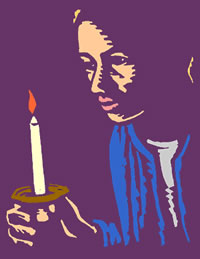
4th Sunday of Lent Year A
Another riveting narrative from John’s gospel. More than once, Jesus was condemned for healing on the Sabbath. In this reading, one such incident is described at length, in a way that calls to mind words of this gospel’s Prologue: ‘The Word was the true light, and his own people did not accept him’. The courageous refusal of the ‘man born blind’ to be intimidated by the authorities of the synagogue, when even his family refuse to stand by him, has given us one of the most memorable incidents in the gospels. Like the story of the Samaritan woman, this incident is recounted in a manner that gives expression to a profound meditation upon the saving work of Christ.
The Saviour himself intones the theme of this meditation: ‘I am the light of the world’. The powerful symbolism of light often finds expression in the Scriptures. It is often appealed to in the Psalms, the confession of faith of the ordinary people in old Israel – God’s Word is ‘a light on the path’ of life (Ps 119); Yahweh himself is Israel’s ‘light and salvation’ (Ps 27). The contrast between light and darkness is often appealed to in the New Testament, as in today’s reading from Ephesians.
The tragedy of spiritual blindness is vividly exemplified in the refusal of the Pharisees to be open to what was confronting them in the signs given through the ministry of Jesus - as their empty reasoning is made to look foolish by the straightforward honesty of the man they are trying to intimidate. ‘You can be his disciple’, they declare in their frustration, ‘We are disciples of Moses’. And, as he responds to their arguments, pointing out that his miraculous healing shows that Jesus is surely ‘a prophet’ and that he must have ‘come from God’, the man who was born blind is progressively ‘enlightened’ – to be finally welcomed by Jesus into the company of his disciples, making his confession, ‘Lord, I believe you are the Son of Man’ – the very title that was to seal the fate of Jesus before the Sanhedrin.
As he urges the Ephesians to a life of authentic discipleship, Paul contrasts a life of ‘goodness, right living and truth’ with the ‘shameful’ things done in the dark. The story of the ‘man born blind’ and his courage in the face of great odds reminds a community with deep roots in old Israel of the challenge of genuine discipleship.
It is now well recognised that the meditation upon Christian faith and life that gave us John’s gospel was made against the background of the Church’s sacramental life. It may well be that today’s narrative – with its progressive reference to anointing, washing and confession of faith – is influenced by the baptismal practice of the community. In the early centuries, the instruction of the catechumens concerning the Church’s sacramental life was an ‘enlightenment’. It is interesting to note, at a time when the catechumenate is assuming an increasing importance in the life of the church, that these instructions made frequent use of John’s gospel.
John Thornhill sm

